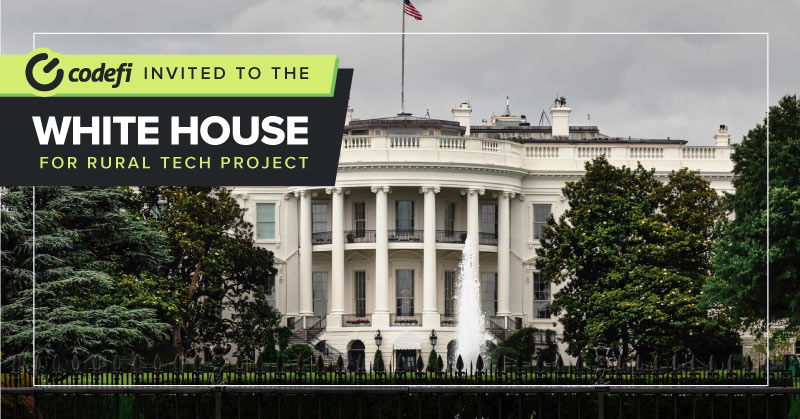
Codefi Invited to White House for Rural Tech Project
July 14, 2023
After the four ID checks just to even get into the White House, I texted James,1 “They actually let me in…” Suckers. Do they not know what I can do with this sort of power?
Joking aside, in late 2020, I was on a panel to review submissions and provide feedback for applications to the Rural Tech Project.2 First off, I was baffled as to why I was even asked to participate. Now that I know, thanks for the nomination Matt Dunne3 (Founder of the Center on Rural Innovation4). Fast forward a couple years, and I received an invitation to the White House to hear the progress of the finalists as they presented, competing for additional funding to support rural tech ed projects across the country.
The projects spanned middle to high school students, from cybersecurity implementation, to students nurturing a colony of a million bees, to students designing CAD files that then allowed them to 3D print an electric vehicle. Jaws dropped. “This is being done in small and rural communities?”
Yeah, it is. And it was an inspiration as to what’s possible with little resources, but some ingenuity and passionate people.
Three great “thinking” or discussions came from this visit. The first was that I hope this project makes it even more clear that there’s not a silver bullet to this. If we want to educate our youth on being the best digital citizens and technologists, setting them up for future success, we have to keep a pretty open mind about what’s possible, experiment, and continuously improve. And instead of trying to answer, “what’s the one best way?”, we should be asking, “how can we create more opportunities to build more ways?”
I was genuinely humbled and honored to even have played a small part in this project and the experience of visiting the White House. Especially considering there were people such as Jesse Haines,5 Director of Grow with Google,6 on the panel. (By the way Jesse, if you’re reading this, we welcome the follow up to find ways to partner with Google for programs like our Youth Coding League7—which is now in 10 states—to expand it further and increase the accessibility of coding to rural and low-income students across the nation. Stacy8 is one of the best people in the world.) Yes, I really did just selfishly include that solicitation in this writeup.
Back to the topic. On a more personal level, or much bigger depending on how you look at it, the second takeaway came when I got the chance to visit the breathtaking Lincoln Memorial and the incredible view of the Washington Monument. I’ll try not to get too sappy and corny on you all, but there was just this empowering presence while I sat there at dusk in between the two–thinking about what I’m doing with my life, and what takes up most of my life: Codefi.

Hopefully without seeming too melodramatic or egotistical (I obviously understand their contributions are much more substantial), I couldn’t help but to feel the analogous sentiment. Washington, leading a group of rebellious people—questioning authority and willing to die fighting for the belief that we deserve the right to pursue our own dreams. Lincoln, leading a divided and polarized nation to fight for all people to have those same rights, and giving voice to those left unheard.
Whether it’s questioning “authority” or fighting for small and rural communities, low socioeconomic or underrepresented demographics, we hold those same virtues. I firmly believe the crew we have with Codefi is one of the most special and unique groups I’ve ever encountered. I’ve worked with thousands of companies and organizations across the country in a variety of capacities, and very few come close to the collective authentic empathy that they have to be the most effective at what they do as individuals, within teams of our programs, as an organization, for the people we serve, our community, region, and beyond. And I have to credit their efforts for me even having the opportunity to be invited to the White House. How lucky am I…
And lastly, a conversation I had with a great friend, Ann Lichter,9 who has recently begun leading an initiative to help small and rural communities increase their capacity to tap into federal and philanthropic funding that often goes uncompetitively to metros. I’m looking forward to seeing how her work helps identity and unlock potential for people who are doing incredible and hard work across the nation.
The great “thing” was our discussion on what metrics should be used to show that a small town or rural community is actually making effective and valuable progress. Steve Blank10 is well-known for his statement that, “startups are not just small versions of large companies.” There are completely different problems that are being addressed and the metrics of success should be focused on what’s called Innovation Accounting,11 introduced by Eric Ries in The Lean Startup,12 rather than traditional business or vanity metrics, because startups are just beginning, have little resources, attempting to answer if what they are doing is even the right thing or how to even do what they need to survive.
I’ve taken that same line of thinking and moved it to the comparison of metros compared to small towns and rural communities. I feel pretty confident to say that in all cases, we (the global we, as in small and rural communities) do not have everything or have the capacity to do everything that creates a vibrant startup and tech-based ecosystem like metros have. These places aren’t just small versions of large cities. Whether it’s missing factors, or links, or people, or organizations, we can’t all be handed the same playbook and be told, “do this and you will be successful,” because each community is so unique, and launching and growing a startup and tech-based economy, especially in a small and rural community is (or at least should be) very similar to an actual high-growth startup.
In terms of what problems should be solved, how to solve them, how to measure success or effectiveness, and how to replicate it - we need our own set of “innovation accounting.” About 20% of Americans live in small towns and rural communities,13 but they receive less than 7% of grantmaking,14 and less than 1% of venture capital dollars15 are invested in people, companies and organizations that are in them. Annually, venture investment makes up only 0.2% of GDP, but delivers an astonishing 21% of U.S. GDP in the form of VC-backed business revenues and employment growth rates that are approximately eight times higher than average. Yet small towns and rural communities significantly lack the talent16 for many of these companies—talent with skills for occupations that are and are projected to continue being some of the most in-demand and highest-wages.17 In order to close those opportunity gaps, we have to prove to stakeholders it’s worthwhile. To successfully do that, we need to think deeply about what metrics and stories make the most sense, for both a return and to more accurately measure effective progress. It needs to be different from “traditional metrics.”
Well, mine and Ann's conversation ended with just searching for how we ask better questions. I know. Anti-climatic. We didn’t solve the world’s problems in one dinner. So really, I just wanted to include this for any policymakers, public workers, economic development organizations, philanthropic groups or people, investors, and anyone in this field who may come across this writeup, to hopefully join us in pausing to think more deeply about these things. At Codefi, we are actively working on this every day and will continue to share in our learnings.

I am honored, humbled, and grateful for my first trip to D.C. But no, I’m not announcing my 2024 campaign to get into politics. We still have a lot of work to do!
- Chris Carnell
Relevant Links
1Dr. James Stapleton
2Rural Tech Project
3Matt Dunne
4Center on Rural Innovation
5Jesse Haines
6Grow with Google
7Youth Coding League
8Stacy Dohogne Lane
9Ann Lichter
10Steve Blank
11Innovation Accounting
12The Lean Startup
13U.S. Census Bureau: One in Five Americans Live in Rural Areas
14USDA: Foundation Grants to Rural Areas From 2005 to 2010: Trends and Patterns
15Kauffman Foundation: 3 trends that prevent entrepreneurs from accessing capital
16Where are all the tech jobs in rural America, and where could we see more of them?
17U.S. Bureau of Labor Statistics: Computer and Information Technology Occupations